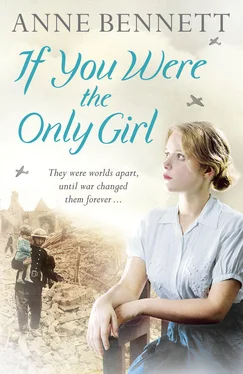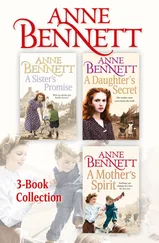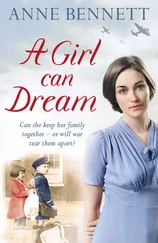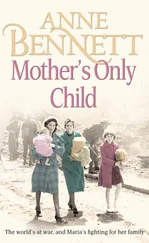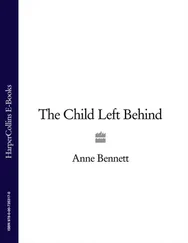Clara heard the slight release of breath and saw the children watching her, the younger ones, eyes alive with hunger, but when she tried to refuse the bread, Minnie turned from the fire and looked at her friend steadily.
‘Leave me some pride, for pity’s sake,’ she said. ‘God knows, I haven’t much else.’
Clara dropped her gaze as she mumbled, ‘I’m sorry, and you’re right. A cup of tea and some soda bread would be lovely.’
She said nothing more until this was set before her. Then she said, ‘First of all, Minnie, let me say how sad I was to hear of the death of Seamus. It must have been a heavy blow for you with five children to provide for.’
Lucy caught her breath. She still grieved for her father and her heart had an ache in it whenever she thought of him.
Her mother replied in a thin, watery voice, ‘It was, but, you know, in the end his death was a blessing because he was suffering so much. And he had been ill for such a long time.’
Lucy knew that only too well.
Casting her mind back while Clara and her mother spoke together, Lucy remembered that when she had been a small child, her father had seemed to be the strongest man in the world. He worked for Farmer Haycock and he was a hard worker and always gave of his best. He was made up to head cowman, and would have been given a cottage too, but Minnie had inherited one from her parents when they died and as it was only a couple of miles away from the farm they decided to stay there. Many times Minnie was thankful for that decision, for once Seamus grew too sick to work, they would have had to leave any farm cottage so another cowman could live in it.
Lucy was not aware of this at the time; she came to that realisation as she grew. As a young child she knew only that when her father came home from work the house became alive. She would fall upon him as soon as he was through the door, and in time Danny did too. Their father would toss the children in the air with ease and they would scream with delight. There was a lot of laughter in their house then, and a lot of singing. Both Seamus and Minnie loved the old songs they had learnt from their parents, and Lucy loved to hear them because it made her feel happy, safe and secure.
‘It was when I was expecting Sam that I first realised that the cough Seamus developed after a bad cold was still bothering him,’ Minnie said. ‘I didn’t take that much notice at first. Seamus always claimed he was fine and, as he said, everyone has a cough now and again, but his didn’t clear up and he would be grey-faced when he came home from work. The children were confused because he wasn’t able to play with them any more. All you could hear in the evening was the rasping sound of his chest and the relentless cough but we had no money to spend on doctors. I started to grow vegetables in the back garden because I couldn’t think what else to do. My priority was feeding the children and keeping the lot of us out of the poorhouse. By the time Sam was born, Seamus was too ill to work and in the end I had to find the money to have the doctor in.’
Lucy remembered the night the sounds from her parents’ bedroom wakened her and she had slipped out of the bed that she shared with her sister and ran across the landing, soon joined by Danny, still flushed from sleep, his hair tousled. Minnie was standing in the bedroom doorway, her hand to her mouth, her eyes wide with shock, and Lucy saw there were splashes of blood on her threadbare nightgown. Then she saw her father on the bed making guttural noises as the blood pumped from him in a scarlet stream. The spasm was over when the doctor arrived, but the evidence was there for him to see.
Lucy heard him tell her mother that her father’s first haemorrhage was unlikely to be his last because he had TB, which was highly infectious.
‘Keeping him at home any longer is madness,’ the doctor had barked. ‘You are risking your own life and that of your children. You must agree that Seamus is taken to the sanatorium immediately or you are risking your whole family being wiped out with it.’
‘Seamus said he must go when he heard what the doctor said,’ Minnie told Clara now. ‘None of the children saw him again and he lasted only six months after that.’
‘Ah, yes,’ Clara said in agreement. ‘It’s hard to see them suffer.’
‘Well, you would know about that, of course.’
‘Yes,’ Clara agreed, ‘and the memories were raw in the beginning, but I wasn’t the only one to suffer a loss. There is only one thing to do and that is to go on as you are doing and fulfill your intention of keeping the children alive and out of the poorhouse.’
‘Aye, so far,’ Minnie said. ‘Sometimes, though, I feel as if I’m balanced on a knife edge. You went to Birmingham and made a new life for yourself – made up from lady’s maid to housekeeper within three years.’
‘The aftermath of the Great War helped me there,’ Clara said. ‘The war had given women and girls greater opportunities and after it fewer girls were looking for “in service” work.’
‘Did you not mind going to live with strangers?’
‘Not really,’ Clara said. ‘My brothers were very kind to me but I knew I couldn’t be beholden to them and their wives for ever. By taking a job in service I had a roof over my head, clothes on my back and plenty to eat, and though the wages weren’t much to start with, they have improved with time. And that is where I can help you, Minnie, I am looking for a new scullery maid and your Lucy is of an age to work.’
‘In Birmingham?’ Minnie cried. ‘I could never countenance her being so far away.’
‘Now would I ask you to?’ Clara said. ‘I know how precious daughters are. But this is the beauty of it. The Master of the house where I work, Lord Charles Heatherington, was a general in the army and was recently badly hurt in a skirmish in India. He spent months in hospital and eventually insisted on being shipped home where he said he could be nursed just as well. I would say he was right, too, because he is cared for by his batman, a man called Rory Green, a taciturn Scot who is devoted to the Master. Anyway, the Mistress decided that a change of scene and peace and quiet are what her husband needs now and they have taken charge of a large house in its own grounds, a place called Windthorpe Lodge, just outside Letterkenny.’
‘Donegal Town is a long way from there.’
‘That doesn’t really matter,’ Clara said. ‘All the positions are “live in”, you see. I have a housemaid and a kitchen maid, both a bit older than Lucy, and I am short of a scullery maid.’
Clara knew that she didn’t need to be short of a scullery maid, that she could have filled the post ten times over, but though in her letters Minnie never moaned, Clara had known things would be tight after Seamus died and she often worried that she could offer her friend no help. Then Lady Heatherington started making plans to decamp to the North of Ireland for a while and Clara thought straight away of helping her old friend by offering Lucy employment.
‘I never thought of Lucy doing that kind of thing,’ Minnie said.
Clara hid her impatience and asked instead, ‘What had you in mind?’
Minnie shook her head. ‘You lived here,’ she cried, distressed. ‘You know there is little employment for young girls.’
Clara put her hands over Minnie’s agitated ones and said, ‘Please, listen to me, Minnie. Lucy’s job could lift you out of the extreme poverty you are in at the moment. You would have one less child to feed or find clothes for, and she will be paid eight shillings a week, a goodly portion of which I know she will want to send to you.’
Minnie cast an anguished glance at Lucy as if she could hardly believe what she was hearing. ‘But when will I see her?’ she cried.
Читать дальше
